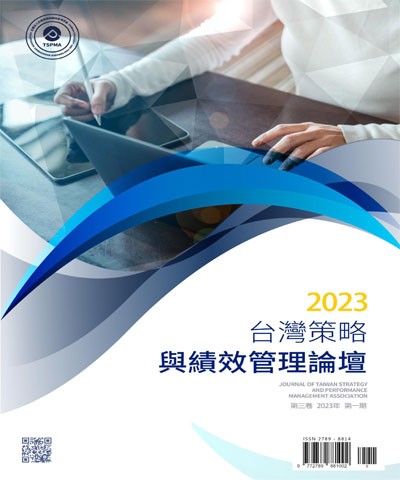
台灣策略與績效管理論壇/Journal of Taiwan Strategy and Performance Management Association
台灣策略與績效管理學會,正常發行
選擇卷期
- 期刊
Even though Small- and medium-sized enterprises (SMEs) play a crucial role in supporting industrial development over the past decades in Taiwan, they still do not own sufficient resources to cultivate innovation abilities. It is implicitly assumed that these SMEs may rely on government and research institutes to accomplish their internal innovation activities. These complex and mutually complementary collaboration relationships are formed as innovation ecosystem where the innovative resources are offered by government and research institutions. Therefore, we explore how government and research institutes facilitate innovation ecosystem under the circumstances of the digital transformation of Taiwan's industry, which may stimulate economic growth in turn. We primarily focus on the four major research institutes of the Ministry of Economic Affairs, namely the Institute for Information Industry (III), Industrial Technology Research Institute (ITRI), Metal Industries Research & Development Centre (MIRDC), and Plastics Industry Development Center (PIDC). By means of focusing on these four research institutes, this study provides a rationale for explaining how research institutes can better support the innovation efforts of SMEs and explore innovation ecosystem evolution strategies. We elaborate an inductive case study and secondary data from multiple sources of a particular innovation ecosystem and focus on the inter-organizational collaboration among government, research institutes and SMEs in the ecosystem. More specifically, we take advantage of the multi-level research about the context, processes, and impacts of innovation ecosystems to identify the relationships among government agencies, research institutes, and SMEs.
- 期刊
To promote innovation outcomes in Taiwan, government and research institute proactively launch a series of programs to develop advanced technologies to attract global investors. The government-led programs aim to initiate an international connection network, which is called regional entrepreneurial system-building. This mechanism not only includes individual invention or teams' innovation outcomes but also provides new startup ventures access to international funding. Therefore, we examine how to effectively build a regional entrepreneurial ecosystem in this study. Existing literature, however, pays too little attention to the role of the government and research institutes to discover the intrinsic values of these government-led programs. In addition, it is still unclear about the actual effects of these mechanisms. Consequently, we conduct a multiple-case study, collect secondary data, and study literature reviews to identify the key factors of the effective regional entrepreneurial ecosystem. Finally, we propose a conceptual framework for entrepreneurial management at the regional entrepreneurial ecosystem level.
- 期刊
本研究旨在探討2013-2017年宜蘭地區高中與高職11所(4所公立高中、2所私立高中、5所公立職校)的校安績效。本研究整合加權差額變數資料包絡分析法與平衡計分卡,採用產出導向模式評估樣本學校整體校安績效與個別績效(學習與成長構面、內部流程構面、顧客滿意構面、財務構面)。研究發現:(1)學校校安學習成長、內部流程構面績效尚可,整體、顧客及財務構面須加強;(2)多數學校處於固定規模報酬,5年期間皆處於固定規模報酬有1所,連續2年規模報酬遞增有1所,處規模報酬遞減有24所;(3)D01為最佳學習與成長、顧客及整體績效學校,D11有最佳內部流程績效學校及D02為最佳財務績效學校;(4)平均跨期生產力呈現些微成長,係由技術變動所致;(5)公立學校及新住民學生數對校安整體績效有負向影響且具有統計顯著性;原住民學生數對校安整體績效有正向影響且具有統計顯著性。
- 期刊
由於氣候變遷、經濟成長、貧富差距等議題日漸嚴重,聯合國於2015年提出了17項永續發展目標(SDGs),旨在指引全球邁向永續發展,ESG的概念也由此而生。ESG為環境保護、社會責任以及公司治理的縮寫,目的在評估一間公司的整體表現,不僅要財務表現亮眼、照顧好利害關係人,更需要承擔社會責任,企業規模不僅需要做大,更達到永續經營。近期因為疫情和全球氣候變遷、海平面上升等現象,人們開始思考如何與環境共存,企業也在思考營收成長的同時如何達到永續經營。故本研究主要探討由台灣14間金融控股公司所披露的非財務資訊-碳排放量是否會影響股價的變動。先前的文獻多以迴歸模型驗證台灣上市之金控公司所揭露之碳排放量與故價報酬之間的關係,而本研究則以分量迴歸分析進一步的驗證,結果顯示金控公司所揭露的碳排放量與股價報酬呈現負向相關,故表示金融控股公司落實ESG確實可以影響股價報酬,也凸顯了ESG永續發展在全球及各領域上的重要性。期望其他金融業者在未來或能以本文之研究結果作為建立穩健的測量、管理及減少財務排放方法之參考,為在實現淨零排放的目標上作出貢獻。

